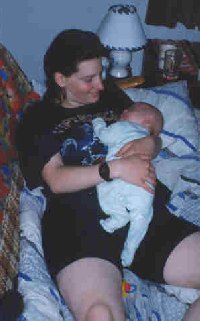 The Benefits of Breastfeeding
The Benefits of Breastfeeding

There are loads of reasons to breastfeed.... ok, as always, there are also some drawbacks.... but here's some of the biggest
benefits of feeding your baby the most natural way:
FOR MUM
|
 |
LIFESTYLE
|
|
FOR BABY
|
|

I thought I would also add my comments about 6 of the most commonly given drawbacks to breasfeeding.....
SAGGY BREASTS AND SORE NIPPLES
Saggy breasts are largely due to the increase in size during pregnancy, and not breastfeeding, infact engorgement which may lead to some sagginess is often worse in mothers who don't breastfeed - as feeding can releive the problem - the key to keeping in shape is a supportive bra during your pregnancy. Sore nipples are, unfortunately, common in breastfeeding mothers, but are due to inexperience and a poor latch by the baby, they are not inevitable and you do not get sore nipples when the baby is feeding correctly. You can prevent this from being a problem by getting plenty of advise and support from someone who knows what they are doing.DAD CAN'T FEED BABY
True!.. and I'm not going to say "yes but he can change nappies and bath the baby instead", because quite frankly there's no comparisson. There are two sides to this... mum doesn't get a break from the feeding routine which can be hard work: but in my experience dad's tend to want to feed their baby less once they are working full time again, and somehow most men manage to sleep right through a baby's night crying so mum is still the one who gets up to do the feed! Secondly dad feels left out. He hasn't had the last nine months to bond with the baby and almost certainly feels jelous of the attention you are giving the baby, but this doesn't last that long. Although Matthew's dad was a little upset at first with my breastfeeding he later said that he was really pleased that Matthew had been breastfed as he hated seeing mother's plonking bottles in babies mouths to keep them quiet. He also has seen some undoubted benefits to Matthew's health.... and when I was mixed feeding after returning to work he soon found out what hard work it is to sterilise and make up feeds every day! Plus dad can get involved with feeds later... once breastfeeding is established.BREASTFEEDING MAKES YOU TIRED
This is a myth. Being a mum makes you tired, true, but producing milk really doesn't make a huge inpact on your body... especially compared to the full time life-support it provides the baby when you are pregnant. Makeing milk does take up calories, which may mean you eat more, or may make you feel like doing less, but those night feeds when all you have to do is bring the baby into bed and lay with him for half an hour are a godsend compared to having to wake up fully, then get up, heat milk, feed and burp your baby (all this takes say an hour)....that's going to make you more tired!... and this is from personal experience I'm not just saying it to promote breastfeeding.I'M RETURNING TO WORK, AND I DON'T WANT TO START SOMETHING I CAN'T CONTINUE
Fine if you really feel this way, it can be hard for both the mother and the baby to give up breastfeeding. But... medically speaking every week of breastfeeding is advantagous to your and your baby's health so it is worth while even for a short time, and personally why miss out on such a great experience?... Perhaps more importantly returning to work, even after only 12 weeks, doesn't necessarily mean you have to give up. You have a right to work breaks and you can use these to express milk, or alternatively you can give mixed feeds: it is amazing how well your baby can cope with producing milk when you are with your baby, but not during the day! You may be supprised that it is not uncommon for breastfeeding mothers to see their babies at lunch time for a feed. Every nursery that I enquired at told me that they had previously supported mothers who wanted to do this. You do need a supportive employer and child care very close to work, but I think many employers understand that they get better results from female employees who feel comfortable in returning to work, and this sort of arrangement certainly helps both mother and baby settle into their new routines.BREASTFED BABIES FEED MORE OFTEN
This again is a complete myth. Some breastfed babies feed often but then so do some bottle fed babies, and some breastfed babies settle very quickly into a routine which includes sleeping through the night. Whether or not your baby feeds often is all down to personality! Some breastfed babies like to comfort feed and so seem to feed often, whilst you can give "formula for hungry babies" in bottles which is more difficult to digest and so take longer, forcing a baby to feed less frequently. In reality most babies, breast or bottle fed, will settle into a feeding routine sometime in the second or third month.I WANT MY BODY BACK
Ok, maybe this is one drawback I agree with! You still have to watch your diet and what medicines you take, and you are somewhat tied to your little one... but then again it is nice to have someone so dependant on you and really it doesn't last long. The first six moths of having Matthew seemed to fly past. I also have to say, many women start to feel broody again within the first year because I think most of us actually miss that dependancy-bond that forms when you are pregnant, and continues through breastfeeding, and deep down I don't think I did want my body back.
